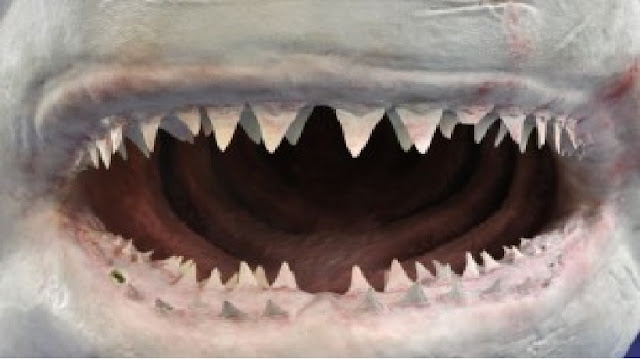Denti eterni? Scoperto il meccanismo della rigenerazione negli squali / Eternal teeth? Discovered the regeneration mechanism in sharks.
Denti eterni? Scoperto il meccanismo della rigenerazione negli squali / Eternal teeth? Discovered the regeneration mechanism in sharks.
Segnalato dal Dott. Giuseppe Cotellessa / Reported by Dr. Joseph Cotellessa
Veder spuntare un nuovo dente invece di dover ricorrere a un impianto sembra un sogno, ma non è escluso che la scienza non ci regali, in futuro, anche questo. Potrebbe trovarsi nelle fauci degli squali il segreto per ottenere una dentatura che si rigenera per tutto l’arco della vita. Un gruppo di ricercatori dell’Università di Sheffield, nel Regno Unito, ha infatti individuato il meccanismo responsabile della rigenerazione continua dei denti degli squali, che permette di rimpiazzarli man mano che vengono persi.
Il segreto
Secondo lo studio, pubblicato sulla rivista Developmental Biology, il merito è della lamina dentaria, costituita da cellule epiteliali possedute anche dall’uomo, al quale però consentono solo un ricambio, dai denti da latte a quelli permanenti. Diversamente da noi gli squali, che possono avere contemporaneamente fino a 3.000 denti sviluppati su più file, ne perdono almeno 30.000 nel corso della vita, ma quelli persi ricrescono nel giro di qualche mese. Il team guidato da Gareth Fraser, analizzando gli embrioni di una specie di squalo detta Gattuccio, ha individuato il gruppo di geni responsabili del programma di ‘rigenerazione permanente’ e della formazione della lamina dentaria.
In prospettiva
“La notizia positiva – ha detto Fraser al Daily Mail – è che questi stessi geni sono responsabile dello sviluppo di tutti i denti dei vertebrati, compresi gli esseri umani”. Nell’uomo tuttavia, la possibilità di utilizzare le cellule epiteliali sbiadisce con gli anni che passano e, una volta adulto, la lamina dentale è perduta. Ma Fraser non ha dubbi che “la rigenerazione sarà possibile. Durante l’adolescenza – spiega – le cellule si deteriorano, ma c’è la possibilità di poterle rinvigorire con future terapie odontoiatriche”.
ENGLISH
Seeing negotiate a new tooth instead of having to resort to a plant looks like a dream, but it is possible that science will not gifts, in the future, too. Could find itself in the jaws of the sharks the secret to getting a set of teeth that regenerates throughout a lifetime. A group of researchers at the University of Sheffield, UK, has identified the mechanism responsible for the continuous regeneration of the teeth of sharks, which allows to replace them as they are lost.
The secret
According to the study, published in the journal Developmental Biology, the merit of the dental lamina, consisting of epithelial cells also owned by the man, but to which only allow a spare, from baby teeth to permanent ones. Unlike us sharks, which can have up to 3,000 teeth developed simultaneously on multiple files, they lose at least 30,000 over a lifetime, but those lost will grow back in a matter of months. The team led by Gareth Fraser, analyzing the embryos of one species of shark that Gattuccio, identified a group of genes responsible for the 'permanent regeneration' program and the formation of dental lamina.
Looking ahead
"The positive news - Fraser said the Daily Mail - is that these same genes are responsible for the development of all the teeth of vertebrates, including humans." However, in humans, the possibility of using the fade epithelial cells with the passing years and, once adult, the dental lamina is lost. But Fraser has no doubt that "regeneration will be possible. During adolescence - he explains - cells deteriorate, but there is the possibility of being able to reinvigorate future with dental treatment
Da:
http://www.popsci.it/denti-eterni-scoperto-il-meccanismo-della-rigenerazione-negli-squali.html




Commenti
Posta un commento